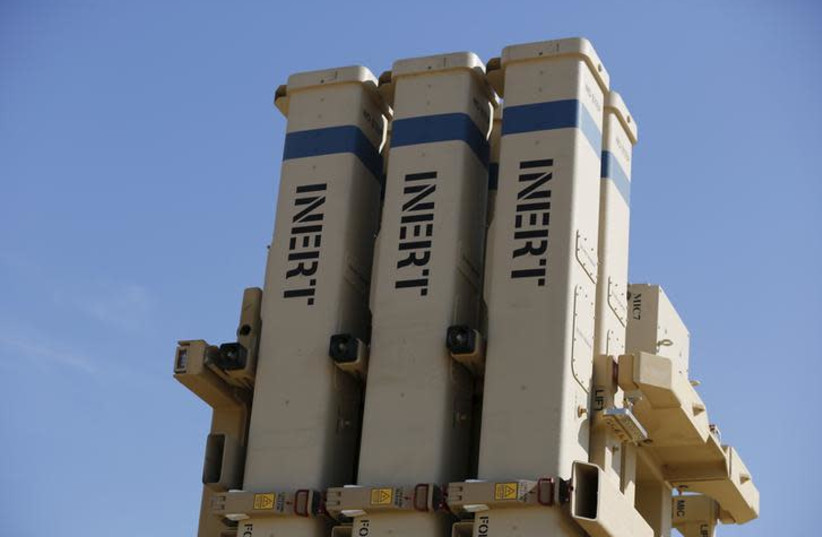The Russia-Ukraine War will lead to an increase in defense spending, analysts told The Media Line, as companies from around the world gathered to show off their latest weapons at the biennial Doha International Maritime Defense Exhibition and Conference (DIMDEX) in Qatar this week.
For more stories from The Media Line go to themedialine.org
Delegations from 92 countries, including NATO member states the US, UK, France, and Germany, as well as Egypt, Iran, and Iraq, attended the three-day conference, according to DIMDEX. Weapons from drones to armored vehicles to model warships were on display.
R.-Adm. Cengiz Fitöz, deputy commander of the Turkish Coast Guard, and Ismail Demir, the head of the Turkish Defense Industries Organization in the Presidency of the Republic, attended the conference.
Thirty-two Turkish companies were among the more than 200 taking part in the expo, Demir said on Twitter.
Demir was sanctioned by the US over Ankara’s purchase of an anti-missile air defense system from Russia, the S-400.

The Turkish Embassy in Qatar tweeted that the ministers of defense of Azerbaijan and Somalia, allies of Ankara, attended the reception given by the legation for conference attendees.
Sine Özkaraşahin, an analyst with the Istanbul-based EDAM Centre for Economics and Foreign Policy Studies, told The Media Line that such a conference is a “good intellectual platform for reaching both public and private stakeholders working on [or] interested in defense technology Solutions and showcase capabilities.”
Özkaraşahin believes the West’s hesitance to become involved in the war in Ukraine has led countries, especially the Baltic states, to increase their military capabilities.
US defense firms have already seen the effect of European countries perceiving their security to be at greater risk, she said.
“This fear and the increased need for deterrence fuels arms sales, and defense giants such as Lockheed Martin and Raytheon have confirmed the direct influence of the invasion on their sales and transactions,” Özkaraşahin said.
Days after the war in Ukraine started, Chancellor Olaf Scholz announced that Germany will allocate €100 billion ($110 billion) in this year’s budget for defense, up from €53 billion in 2021.
Özkaraşahin added that air defense systems, weapons that allow for better communication, and armed drones have become more popular.
She expects an increase in drone sales from Turkey, especially to Eastern European countries that are part of NATO.
Poland was the first NATO member state to buy drones from Turkey, with a purchase of 24 last year.
This month, it said it wanted to also buy drones from the US.
Drones from the Turkish firm Baykar Defense have become especially high-profile in light of Ukraine’s use of them against Russian forces.
Kerim Has, a political analyst focusing on Russia and Turkey, told The Media Line the war in Ukraine will lead to a “consolidation” of NATO.“There will be two parallel processes. First, each country is going to invest more in … its military potential,” he said. “Secondly, the NATO alliance is going to strengthen from inside.”
NATO member states have promised for years to spend at least 2% of their GDP on defense but many countries fail to do so. Has believes most member states will be buying from the US and UK, but that they will also increasingly look at Turkey as well considering the success of its drones.
Ukraine’s use of drones to combat one of the most powerful militaries in the world, with Russia suffering what is thought to be several thousand fatalities, shows the weapons’ potential to other buyers, he noted.
Sales prospects for Turkey’s drones are quite promising in the coming period, he said. “They are going to grow their market, especially in the European Union, and possibly also in the Gulf and Middle Eastern countries.”
Has believes that if Russia wins in Ukraine, Gulf countries such as Qatar and the United Arab Emirates will be more interested in buying weapons from Moscow, but if Russia ends up losing the war they will more likely look to the US.
He added that if Russia emerges victorious in Ukraine, it will likely become more assertive in the Middle East, leading countries in the region to have a greater need to arm themselves.
The war also could change the balance of power in the region by increasing Russia’s control over the Black Sea, where Ukraine and Turkey have large coastlines. That would lead to Ankara buying more weapons from the US or European countries, Has said.
While Turkish President Recep Tayyip Erdoğan has moved closer to his Russian counterpart, Vladimir Putin, in recent years, their countries are historical rivals and have sided with opposing forces in Syria and Libya.
“Turkey should also consider that dynamic, in the north and the south,” Has said, referring to the Black Sea north of Turkey and Syria on its southern border.
It stands to reason that Ankara is going to increase its military capabilities, he said.
